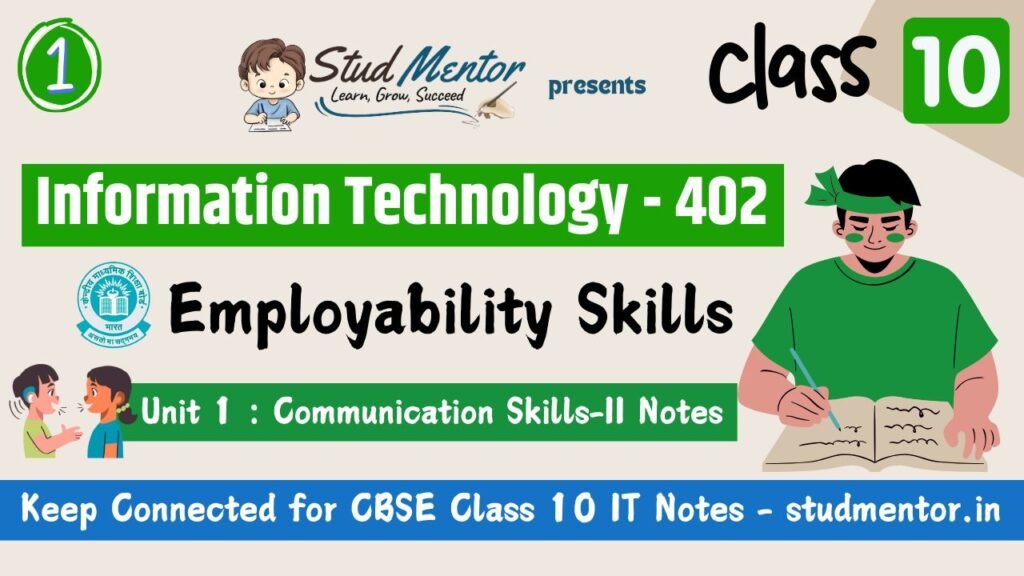In this article we providing information regarding latest CBSE Class 10 IT (Information Technology) – Unit 1 Communication Skills Notes 2024
CBSE Class 10 IT (Information Technology) – Unit 1 Communication Skills Notes 2024
We are giving Complete Notes and Important Points for Class 10 IT (402) – Unit 1 Communication Skills 2024-25.
Methods of Communication
Before Learning the Methods of Communication we should learn about What is Communication ?
What is Communication ?
- The word ‘Communication’ comes from the Latin word communicare, meaning ‘to share’.
- We need good communication skills to talk with other people effectively, share our ideas, and build good relationships.
Important Parts of Communications
- Transmitting – The sender transmits the message through one medium or another.
- Listening – The receiver listens or understands the message.
- Feedback – The receiver conveys their understanding of the message to the sender in the form of feedback to complete the communication cycle.
Methods of Communication
- Face to Face informal Communication
- E-Mail – Send Mail
- Notices / Posters – Sale
- Business Meetings – Group of People
- Other Methods – Social Media, Message, Phone Call, Newsletter, Blog etc.
Choosing the right method of communication depends on
- Target Audience – Identify the target audience to who you want to send your msg.
- Costs – Calculate the cost required to share your msg.
- Kind / Types of Information – Identify the kind/type of information you want to share.
- Urgency / Priority – How urgently do you want to share your message and information ?
Communication is classified into two ways :
- Verbal (Oral or Written) – Includes Sounds, Words, Language and Speech.
- Non – Verbal
Types of Verbal Communication
- Interpersonal Communication – Formal or Informal
- Written Communication – Letters, Circulars, Reports, SMS, Social Media
- Small Group Communication – Two or More than People involved.(Team, Board Meetings, Press Conference)
- Public Communication – Address Speech
Advantages of Verbal Communication
- In verbal communication, we can share our ideas quickly and get a quick response from the reciever.
- Verbal communication is very interactive.
- We can modify our messages based on the receiver’s response.
Some Disadvantages of Verbal Communication
- When the right words are not used in the right place, it becomes hard to understand the message.
Mastering Verbal Communication
- How you can enhance and Master in your Verbal Communication Skills.
- Think before you speak
- To the Point and Clear
- Confidence and Body Language
Non – Verbal Communication
- Non-Verbal Communication is the expression or exchange of information or messages without using any spoken or written word.
- Facial Expressions – Such as Happiness, Sadness, Anger, Surprise, Fear etc.
- Smile when you meet someone.
- Keep your face relaxed.
- Match your expression with your words.
- Node while listening.
- Posture – Body Posture
- Keep you shoulders straight and body relaxed.
- Sit straight while resting your hands and feet in relaxed position.
- While standing, keep your hands by your sides.
- Gestures or Body Language – Body Movement by Express an idea or meaning (raising hands in class)
- Keep your hands open.
- Avoid pointing your finger at people.
- Use your palms to point towards someone.
- Touch – Handshake, Pat on the back to encourage someone
- Shake hands firmly while meeting someone.
- Space – Space is the physical distance between two people.
- When meeting someone, it’s important to maintain an appropriate amount of personal space based on your relationship with them.
- Eye Contact – Eye contact shows that we are paying attention.
- Avoid staring at people, and try to maintain a relaxed look.
- Maintain eye contact with intermittent breaks.
Importance of Non-Verbal Communication
In our day-to-day communication.
- Body Movements, Face, Arms, Etc.
- Voice, Tone, Pause, Etc.
- Words
Visual Communication
- Visual communication proves to be effective since it involves interchanging messages only through images or pictures.
Example Like – No Parking Sign, Danger Sign, No Mobile Phones Allowed We can Understand.
Communication Cycle and Importance of Feedback
Feedback
- Feedback is an important part of the communication cycle.
- For effective communication, it is important that the sender receives an acknowledgement from the receiver about getting the message across.
- The sender sends information, and the receiver provides feedback on the received message.
Friends Feedback is important part for Communication Skills. Like
- Positive Feedback
- Negative Feedback
- No Feedback
Good Feedback.
- Specific – Avoid general comments. Try to include examples to clarify your statement.
- Timely – Being prompt is the key, since feedback loses its impact if delayed for too long.
- Polite – While it is important to share feedback, the recipient should not feel offended by the language of the feedback.
- Offering continuing support – Feedback sharing should be a continuous process.
Importance of Feedback
- It validates effective listening
- It motivates
- It improves performance
- It is always there
Barriers to effective Communication
What is Effective Communication ?
- Communication can only be effective if we follow the basic principles of professional communication skills. These can be abbreviated as 7 Cs of communication :
- Clear
- Concise
- Concrete
- Correct
- Coherent
- Complete
- Courteous
Thanks to Beloved Readers.



